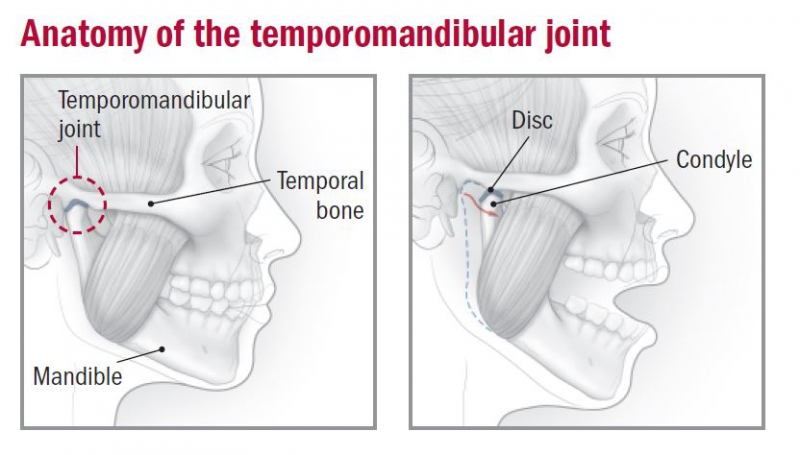
The Temporomandibular Joint (TMJ) connects your jawbone to your skull. TMJ disorders cause pain in the jaw joint and in the muscles controlling jaw movement. PAL Physiotherapy offer advance TMD treatment in Gurgaon with the best team of physiotherapist. The exact cause of TMJ disorder is under debate and difficult to determine. The pain being experienced by the patient may be due to a combination of factors, such as genetics, arthritis or jaw injury. Hence, they are difficult to isolate and analyze. Patients complaining of jaw pain also develop a habit of clenching or grinding their teeth, although this may be a habit only and not a symptom of TMJ disorders.
In a majority of the cases, the pain and discomfort associated with TMJ disorders are short-lived and temporary. It can easily be relieved with self-managed care or nonsurgical treatments.
The exact cause of Temporomandibular Dysfunction (TMD) is yet not known with certainty. The symptoms are generally believed to arise from problems with the muscles of the jaw or with the parts of the joint itself. Any injury to the jaw, the joint, or the muscles of the head and neck can be a possible triggering factor for TMD. Factors like clenching or grinding the teeth, arthritis in the joint or even stress can possibly result in Temporomandibular Joint Dysfunction.
Signs and symptoms of TMJ disorders include -
TMJ disorders can sometimes also result in a clicking sound or grating sensation as the patient opens their mouth or chews something. But if there's no pain or limitation of movement associated with your jaw clicking, you probably don't need treatment for a TMJ disorder.
During the physical examination, the doctor listens to or feels the patient’s jaw as they open and close their mouth. The range of motion in the jaw is also observed closely. The doctor may also press on areas around the jaw. This helps them identify sites of pain or discomfort. In case, the doctor or the dentist sees the presence of a problem with the teeth, the patient may need dental X-rays.
Further, A CT scan can provide even detailed images, with excellent resolution, of the bones involved in the joint. MRI, on the other hand, can reveal problems with the joint's disk.
Sometimes, the doctor may even suggest TMJ arthroscopy in the diagnosis of a TMJ disorder. This involves the doctor inserts a small thin tube into the joint space followed by the insertion of a small camera to view the area and confirm the diagnosis.
Physiotherapy has increasingly been proposed as an effective treatment for Temporomandibular Joint Dysfunction(TMJ) in Gurgaon. The patient must not ignore the symptoms, however mild they are, and consult a qualified physiotherapist to get a personalized treatment plan designed. The major aims of the physiotherapy treatment for Temporomandibular Joint Dysfunction are
Although TMD is a recurring disorder, it is a self-limiting condition. It does not tend to be very progressive. Non-invasive, conservative treatments are the primary treatments. Physiotherapy treatment is very useful in relieving and managing TMD, even when the symptoms are long-standing and severe. It alleviates the symptoms and makes it easy for the patient. With dedicated physiotherapy sessions which includes Ultrasound Therapy, Class 4 Laser Therapy, TENS, a majority of the patients witness a considerable improvement in their symptoms. This approximately takes three to six weeks.
Physiotherapy has also been found quite effective for the treatment of TMJ in Gurgaon opening disorders. This can be attributed to the fact that it isa movement disorder. Mostly, the dentist is also involved in the management of TMJ closing disorders such as bruxism. This is due to the addition of teeth occlusion. In some cases, an occlusal splint or bite plate is suggested to the patient. The physiotherapist should address all the issues reported by the patient and identified in the assessment. If the patient’s symptoms are acute and inflammatory, the treatment should be gentle and focus at relieving the pain, reducing swelling and muscle spasm.
As the pain begins to settle, the focus of the treatment should shift towards restoring the movement of jaws and correcting their alignment. It should ideally include soft tissue releases with the help Dry Needling Therapy to affected muscles and joint mobilization techniques. Treating neck pain and headaches, if any, is also included in the plan. Posture correction is crucial and should be addressed at priority. The physiotherapist must teach the patient to perform exercises in order to improve coordination, stability, and alignment of the jaw.
